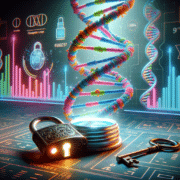"The Rise of DNA Testing: Understanding Your Genetic Makeup"
The Rise of DNA Testing Understanding Your Genetic Makeup
In recent years, DNA testingA process of analyzing an individual's genetic material to identify genetic variations, mutations, or markers that provi... More has become increasingly popular as a tool for understanding our genetic makeup. This cutting-edge technology has revolutionized the healthcare industry and has the potential to provide valuable insights into our health and wellness. Here, we will explore the rise of DNA
DNA (Deoxyribonucleic Acid) is a molecule that carries the genetic instructions used in the growth, development, fun... More testing and how it can help you better understand your genetic makeup.
Benefits of DNA Testing
- Personalized Health Insights: DNA testing can provide you with personalized health insights based on your genetic makeup. This information can help you make more informed decisions about your health and wellness.
- Identifying Genetic Risks: DNA testing can help identify genetic risks for certain health conditions, allowing you to take proactive steps to prevent or manage these risks.
- Optimizing Nutrition and Fitness: By understanding your genetic makeup, you can optimize your nutrition and fitness routines to better suit your genetic predispositions.
- Enhancing Personalized Medicine: DNA testing can help healthcare providers tailor treatment plans to individual patients based on their genetic profiles, leading to more effective and personalized care.
How DNA Testing Works
DNA testing involves analyzing specific markers in your DNA to identify variations that may be associated with certain health conditions or traits. This process typically involves collecting a sample of your DNA, either through a saliva sample or a cheek swab, and sending it to a laboratory for analysis. The results are then used to provide insights into your genetic makeup and potential health risks.
Types of DNA Testing
- Carrier Testing: This type of DNA testing is used to identify whether an individual carries a genetic mutation that could be passed on to their children.
- Health Risk Testing: Health risk testing looks for variations in your DNA that may increase your risk for certain health conditions, such as heart disease or cancer.
- Ancestry Testing: Ancestry testing is used to trace your genetic lineage and determine your ethnic background.
- Pharmacogenomics Testing: This type of DNA testing analyzes how your body metabolizes certain medications, helping healthcare providers tailor treatment plans to your genetic makeup.
Considerations Before DNA Testing
- Privacy Concerns: Before undergoing DNA testing, it is important to understand the privacy implications of sharing your genetic information. Make sure to research the policies of the testing company and how they handle your data.
- Emotional Impact: Some individuals may experience emotional reactions to the results of DNA testing, particularly if they uncover unexpected information about their genetic makeup. Consider speaking with a genetic counselor before undergoing testing.
- Health Insurance Coverage: Check with your health insurance provider to see if DNA testing is covered under your policy. Some insurers may require a medical reason for testing to be covered.
Conclusion
As DNA testing continues to advance, more individuals are turning to this technology to gain insights into their genetic makeup and improve their health and wellness. By understanding the benefits and considerations of DNA testing, you can make informed decisions about whether this tool is right for you. Talk to your healthcare provider or a genetic counselor to learn more about how DNA testing can benefit you.








